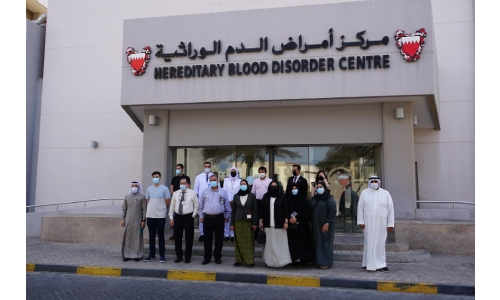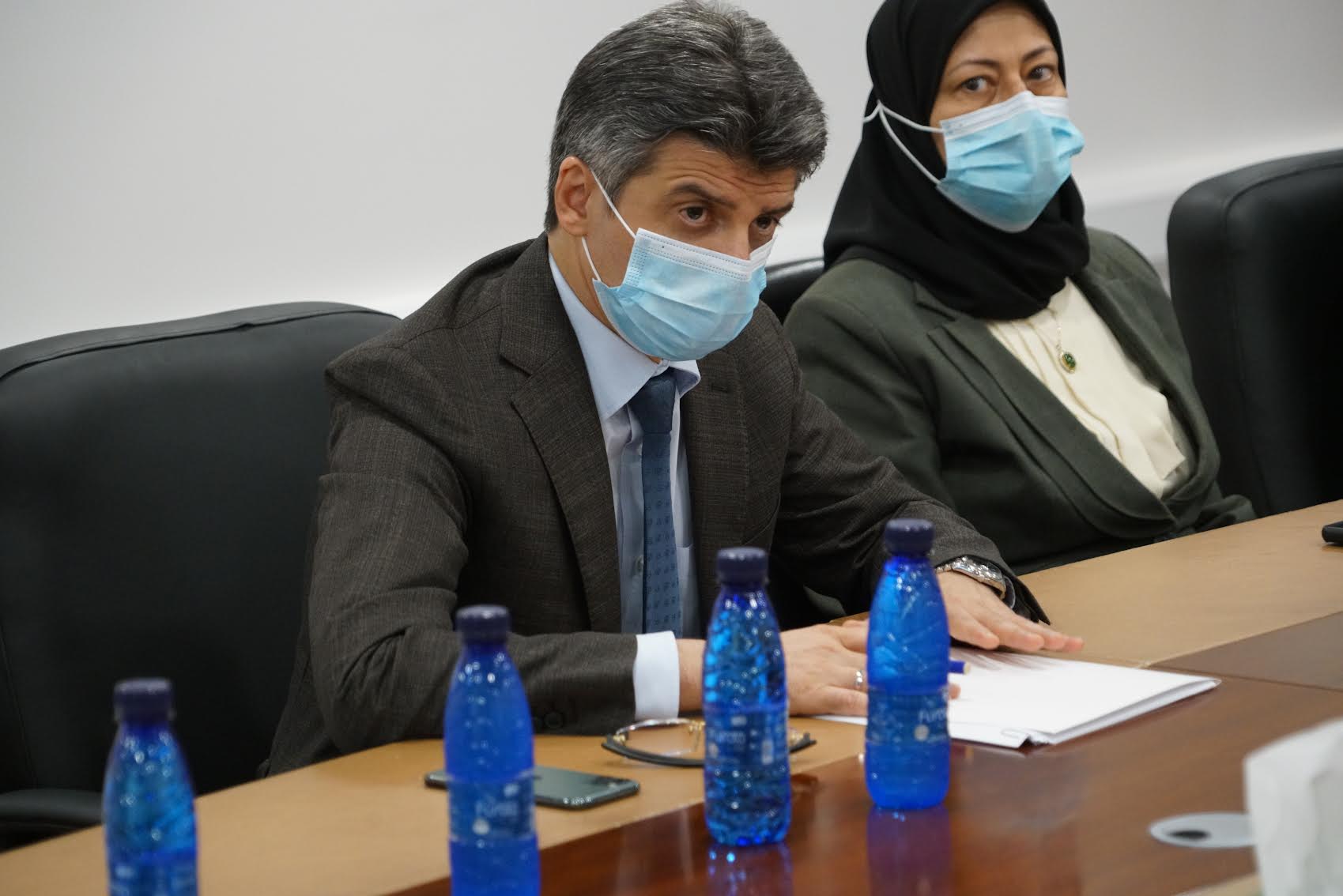Bahrain succeeds in combating sickle cell disease
TDT | Manama
The Daily Tribune – www.newsofbahrain.com
Bahrain is at the forefront of countries that have made great achievements in the treatment of Sickle Cell Anaemia, according to senior officials and doctors at the Hereditary Blood Disorder Centre at Salmaniya Medical Complex (SMC).
The government’s initiatives in providing health care for sickle cell patients began as early as 1984 when the government adopted a national plan to combat Sickle Cell Anaemia.
Since then, the government implemented as many as 182 projects aimed at limiting the spread of sickle cell disease and providing adequate healthcare and treatment for patients.
In 1984, the first genetic clinic was established at Salmaniya Medical Complex, and a hereditary disease control programme was launched. In 1993, a premarital counselling service, within a campaign to reduce the spread of the disease.
The campaign aimed to build a database to count the number of infected births through the newborn screening programme as well as the student screening programme. In 2012, the Chronic Pain Management clinic was established, and in 2013, an electronic platform was set up to enhance communication between the relevant medical team and patients.
In 2014, the Hereditary Blood Disorder Centre, the first integrated centre for the treatment of sickle cell patients, was inaugurated.
In 2018, a comprehensive multidisciplinary clinic was established to provide healthcare in a more advanced way. In addition, a telemedicine system was introduced to save effort and reduce waiting time. Bahrain also developed a programme to exchange expertise with renowned international experts from UK-based King’s College and the John Hopkins Hospital in the US.
In addition, the Visiting Physician Programme was launched to attract medical expertise. During an interaction with members of the media, Dr Ahmed Al Ansari, the Chief Executive Officer of Government Hospitals, said Bahrain's policy-makers and authorities attach great importance to providing quality health services and promoting awareness among the Sickle Cell Patients.
Speaking to The Daily Tribune, Dr Raja’a Al Yousef, Deputy Chair of the Hereditary Blood Diseases Committee, said the centre has been mainly focusing on patients suffering from Sickle Cell Anaemia although it caters to all patients suffering from blood disorders.
“This is a unique facility in the region, which was established considering the emergency treatment required for Sickle Cell patients, who, at times, suffer from extreme pain. “We didn’t want Sickle Cell patients to get mixed with other emergency and accident patients. And the setting up of this centre has made a huge impact on the lives of Sickle Cell Patients in the Kingdom.” She said regular health assessment is important for all Sickle Cell patients. “Trained triage nurses and paramedics are special requirements. Whether it is emergency or stable cases, care has to be given and administering the right painkiller is a major part of care for patients. There is a huge range of painkillers.
They also require intravenous hydration. Hydrating the patient is one of the ways to fix the severity of the pain crisis. “The ground floor of the building has facilities for IV hydration and pain management.
In most cases, patients can leave within eight hours of hospitalisation within the day after the procedures for pain management are administered. “If they are not cured of pain in this stipulated time, they are moved towards and are treated there. Four blood exchange or blood transfusion machines are here and an additional machine is dedicated for special patients.” Dr Raja’a said there are over 5,000 Sickle Cell patients in Bahrain, citing Health Ministry records.
“We have tie-ups with many renowned institutions from across the world including John Hopkins Medical University to carry out research and data sharing. Teams from these higher institutions often visit the centre as part of research activities. That doesn’t mean we are short of challenges, although we have the best facility in the region, the huge number of patients poses a challenge in terms of providing the treatment.
We have accumulated appropriate experience to handle the situation.” Highlighting the significance of training to boost the treatment offered to patients, she said: We also provide the best training as it is important to have trained hands handling cases, both emergency and stable. Clinical trials, as well as research, are also carried out here as part of growth strategies.” “Sickle cell disease is a chronic condition and is always associated with pain.
Some patients demand certain types of medication, which wouldn’t be the appropriate prescription of the doctor. So, persuasion is an important thing. They will suggest to the nurse to be treated in a certain way, which is not in the best interest of the patient. Administering morphine is subject to the discretion of the doctor.
If required otherwise, the doctor can prescribe other pain killers.” Dr Raja’a attributed the high prevalence of Sickle Cell Anaemia within the Arab societies to marriages within the families. “This is basically a hereditary condition. But, now with premarital counselling and screening, the couple is aware of their status before embarking on the path toward marriage. Raising awareness is the major step in preventing Sickle Cell cases.” She said continuity of care and awareness of Sickle Cell complications have led to a reduction in Sickle Cell deaths. “There is now perfect training for nurses and doctors to spot the early signs of danger or life-threatening issues in patients. Early detection of early signs of risk is vital in saving the lives of Sickle Cell patients.”
Considering the importance of mental well-being for Sickle Cell patients, Dr Raja’a said psychiatric care is provided to patients at the centre. “We have a consultant psychiatrist and psychiatric nurse working here with us. Earlier, we were referring patients to Psychiatric Hospital. We also have a social worker provided by the social services department of SMC.
Hence, the sociological and psychological aspects of patients are very well taken care of here.” Dr Tharwat Waddy, a Consultant Hematologist at the Centre, said: “Blood transfusion services have also been developed through the provision of the most up-to-date equipment to reduce potential medical complications, resulting in 300 per cent improvement in the blood transfusion compared to the previous system.”
Regarding medicines used to treat patients, Hydroxyurea has been used in Bahrain since 1997 and 65pc of patients are taking Hydroxyurea, he added. In 2021, the Ministry of Health started providing Crizanlizumab, a revolutionary life-changing drug treatment for patients suffering from sickle cell disease.
Bahrain is the second country to use this breakthrough drug after the US and 50 patients are currently taking it in Bahrain.
As a result of Bahrain’s strenuous efforts, the percentage of newborns with sickle cell has gone down to 0.2 annually, and the percentage of sickle cell disease deaths has dropped to 43pc.
In addition, Bahrain has achieved a 35pc improvement in the treatment of chronic diseases as a result of the use of tablets.
Dr Ahmed will open a learning centre to ensure the continuous professional development and implementation of best practices in Sickle Cell care. “Doctors, nurses and paramedics retire or sometimes leave for other assignments; so we have to ensure that a strong line of continuity is implemented across the treatment systems. And the learning centre will help us in this regard,” Dr Raja’a added.
The centre, as of now, has four blood transfusion machines
Dr Ahmed and Dr Raja’a speaking to members of the media
Dr Raja’a explains latest modalities of Sickle Cell care in the presence of Dr Tharawat
Related Posts


